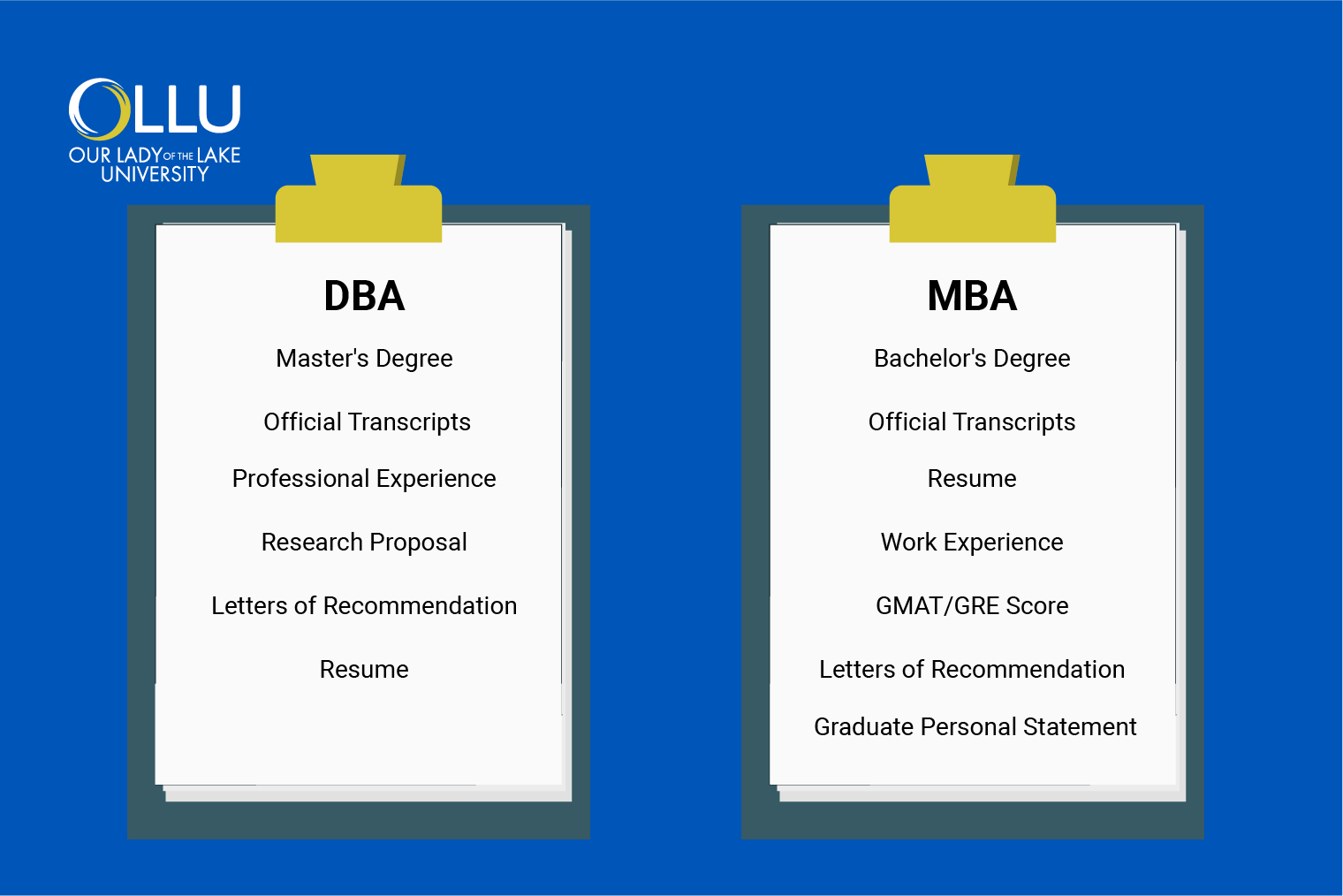DBA vs. MBA: What Is the Difference?
Aug 16, 2024

Are you considering taking your business acumen to the next level, but the graduate degree options are making your head spin? When it comes to furthering your knowledge and advancing your career in business, the two most popular options are the Doctor of Business Administration (DBA) and the Master of Business Administration (MBA). Both degrees offer valuable knowledge and skills, but which one is better for your career?
That's what this article is all about! Join us as we delve into the key differences between a DBA vs. an MBA, the requirements and results stemming from both, and how each degree can benefit you in the long run.
What Is an MBA Degree?
An MBA degree is a graduate-level program that provides you with advanced knowledge and skills in business management. Typically taking one to two years, the curriculum covers core areas such as finance, marketing, operations, and leadership.
At the heart of any MBA curriculum is management training, with a focus on business strategy, leadership, organizational behavior, and other aspects of running a large or small business. Although an MBA is a general management degree, during your studies, you can specialize in concentrations like finance, marketing, healthcare management, entrepreneurship, human resources, etc.
What Is a DBA Degree?
A DBA is a three to six-year professional degree that is the highest level of qualification available in business administration. It allows you to specialize in various business areas such as organizational behavior, information technology management, finance, economics, business management, healthcare leadership or management, etc.
While each school has its own take on the DBA curriculum, they typically have core courses, options for concentrations, and a research component. You can expect to cover topics such as business and management theory, research methods and design, research principles and philosophies, and so on.
Purpose and Focus: DBA vs. MBA Degree
The main difference between an MBA and a DBA program is the primary goals and focus of each degree. An MBA program is designed to provide a broad business management education. As such, it is a degree that enhances your business and management skills and takes more senior-level jobs.
On the other hand, a DBA is a terminal degree in business administration, focusing on applied research and the application of theoretical knowledge in a specialized business practice area. Let's explore these differences in more detail.
DBA degree
A DBA program is typically a specialized and research-oriented degree. It offers advanced knowledge and expertise in a specific area of business, with an emphasis on applied research and advanced analysis.
During your studies, you will learn about current research and theories on business practices, as well as how to conduct independent research at the graduate level.
This way, you can consider the DBA degree as a card that prepares you for academic careers through which you can contribute new insights to the field. At the same time, the degree cultivates leadership capabilities and analytical skills, preparing you for consulting and high-level executive positions.
MBA degree
An MBA program is designed to provide comprehensive education in various business disciplines, such as finance, operations, marketing, and entrepreneurship. It focuses on developing a broad understanding of business principles and strategic management and aims to hone managerial and leadership skills.
While research is part of many MBA programs, they emphasize the practical application of business practices, preparing students for management and leadership roles across industries.
Admission Requirements

Both MBA and DBA programs seek candidates with strong academic backgrounds and professional achievements. However, DBA programs typically require more extensive work experience and often a prior master's degree. Let's look at the differences in admission requirements between MBA and DBA programs.
DBA degree
Typical admissions requirements for a DBA program include:
-
Master's degree from an accredited institution
-
Official transcripts from all previous college work
-
Extensive business/professional experience
-
Research proposal outlining your intended research topic or area of interest for your doctoral dissertation
-
Résumé highlighting your professional or managerial experience
-
Letters of recommendation from academic and professional references
MBA degree
On the other side, the admission requirements for enrolling in an MBA program include:
-
A bachelor's degree from a regionally accredited institution
-
Official transcripts of all previous college work
-
Résumé highlighting managerial or professional experience
-
GMAT or GRE scores
-
Letters of recommendation from professors, employees, or supervisors
-
Work experience of at least two years
-
Graduate personal statement, which includes motivation for graduate studies, background in the field of study, and professional goals
Career Opportunities
Although in distinct ways, both MBA and DBA degrees can lead to career advancement. While an MBA may lead to promotions within a certain business area, a DBA can open doors for executive leadership and academic roles. Let's explore the job roles that become accessible to you upon completing an MBA or a DBA program.
DBA degree
After earning a DBA degree, you can pursue careers in academia, research, high-level consulting, and c-suite executive positions. Specific roles include chief executive officer (CEO), chief financial officer (CFO), vice president, market research analyst, university professor, economist, business consultant, government program manager, director of HR, etc.
MBA degree
After completing an MBA program, you can find employment in various sectors, from project management to human resources (HR) and marketing. Some career opportunities as an MBA graduate include marketing manager, sales manager, logistics manager, HR manager, business operations manager, project manager, investment banker, and financial analyst.
Salary
Earning potential is another important factor to consider when examining the differences between an MBA and a DBA. While location and industry factors can significantly affect the salary, holding a DBA can generally lead to a higher wage than an MBA degree. Let's compare the numbers.
DBA degree
After earning your DBA, you can expect a significant salary increase. According to the Bureau of Labor Statistics (BLS), the usual weekly earnings for doctoral degree holders are $2,109 compared to the $1,737 for those with a master's degree.
However, these numbers vary greatly on the specific job title. In general, in academia salaries tend to be much lower than in the private sector. For example, as a business university professor, you can expect a salary of $97,130. In contrast, as a CEO, you can expect a salary of $842,418—though this depends highly on the industry and the size of the company.
MBA degree
As an MBA graduate, you can expect to earn more than those with a bachelor’s degree. According to a GMAC survey, the median starting salary for MBA graduates is $125,000, significantly higher than the starting salary for bachelor's degree graduates, which is $75,000.
Your salary as an MBA graduate also depends on the specific job title. For example, a project manager can expect a salary of $120,413. On the other hand, a marketing manager can expect a salary of $156,580. As noted above, the salary you get also depends on the industry you specialize in. For example, those with an MBA in finance and consulting tend to earn more than those working in NGOs or educational institutions.
Financial Considerations
As programs offer different services or benefits, the cost of an MBA greatly varies between programs or schools. Typically, top-tier MBA programs often are more expensive than others. However, according to a report by the Education Data Initiative, the average cost of an MBA is $56,850. On the other hand, a doctorate costs way more, with an average of $133,340.
When considering the financial implications of either degree, you also need to calculate the administration fees, textbooks, transportation expenses, and your state's cost of living. To offset these expenses, you can seek financial aid from different sources, scholarships directly from the school, fellowships, grants, employer programs, loans, and apprenticeships.
But does a DBA and an MBA pay off? To determine the return on investment (ROI) of either degree, you can calculate the total cost of the degree and the earning potential you expect to have within the industry. To do so, divide the post-MBA or DBA salary by the degree cost, then multiply by 100. The number you get is the ROI of your educational investment. Numbers aside, in most cases, an MBA and a DBA could pay off within a year of full-time employment.
The Bottom Line
While both a DBA and an MBA degree offer valuable pathways to career advancement, these degrees lead to different career pathways. The question of whether to study for an MBA or a DBA depends on what you want to do afterward.
A DBA would be the better option if you want to move toward research and academia. On the other hand, an MBA would help you consolidate your business knowledge and move into more senior roles within a company or corporation.
Now that you know more about the differences between the two degrees, you can decide whether you want to take your career to the next level. And what better way to start your journey than by exploring DBA and MBA programs, starting with our Master of Business Administration program.
Frequently Asked Questions:
Is DBA equivalent to PhD?
Yes, a DBA is equivalent to a PhD.
Is an MBA the same as a degree in business administration?
An MBA is a specific advanced degree focused on business administration.
What type of MBA is best?
Different types of MBA programs are made to suit specific preferences and career objectives, such as full-time, part-time, executive, international, online, and specialized. So, the best type of MBA is the one that best suits your career goals, background, and interests.
How long does it take to get a DBA degree?
A DBA typically takes between three and six years to complete.